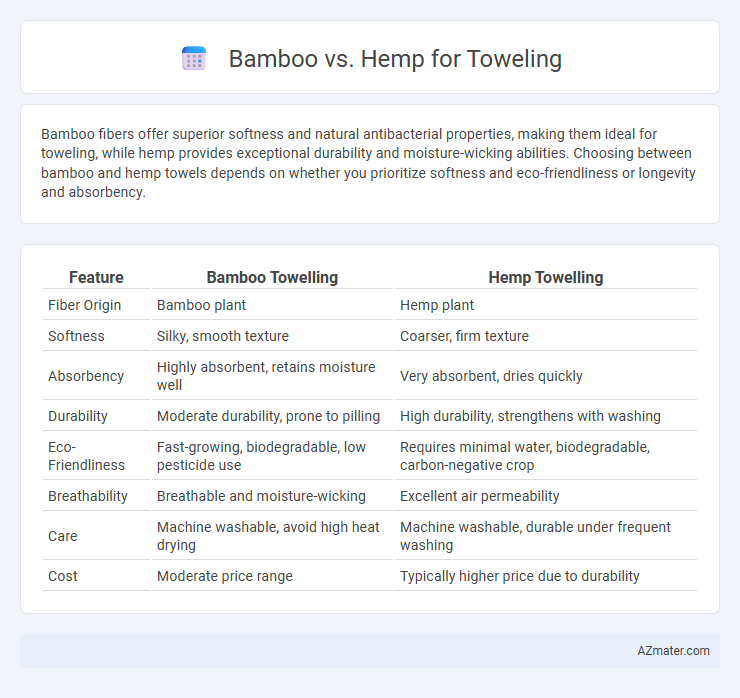Bamboo fibers offer superior softness and natural antibacterial properties, making them ideal for toweling, while hemp provides exceptional durability and moisture-wicking abilities. Choosing between bamboo and hemp towels depends on whether you prioritize softness and eco-friendliness or longevity and absorbency.
Table of Comparison
| Feature | Bamboo Towelling | Hemp Towelling |
|---|---|---|
| Fiber Origin | Bamboo plant | Hemp plant |
| Softness | Silky, smooth texture | Coarser, firm texture |
| Absorbency | Highly absorbent, retains moisture well | Very absorbent, dries quickly |
| Durability | Moderate durability, prone to pilling | High durability, strengthens with washing |
| Eco-Friendliness | Fast-growing, biodegradable, low pesticide use | Requires minimal water, biodegradable, carbon-negative crop |
| Breathability | Breathable and moisture-wicking | Excellent air permeability |
| Care | Machine washable, avoid high heat drying | Machine washable, durable under frequent washing |
| Cost | Moderate price range | Typically higher price due to durability |
Introduction: Why Choose Natural Fibers for Towelling?
Natural fibers like bamboo and hemp offer superior breathability and moisture-wicking properties for towelling, ensuring quick drying and enhanced comfort. Bamboo fibers possess inherent antibacterial qualities, reducing odor and promoting hygiene during use. Hemp towelling is highly durable and eco-friendly, providing resistance to wear and long-lasting softness ideal for daily use.
Bamboo vs Hemp: An Overview
Bamboo and hemp fibers both offer sustainable options for towelling, with bamboo known for its ultra-soft texture and natural antibacterial properties, making it ideal for sensitive skin. Hemp towelling is highly durable, moisture-wicking, and becomes softer with each wash, providing long-lasting absorbency and resistance to mold and mildew. Both materials outperform traditional cotton in eco-friendliness, but bamboo's silky feel contrasts with hemp's robust strength and quick-drying capability, influencing consumer preferences based on comfort versus durability.
Environmental Impact: Sustainability Comparison
Bamboo towelling is highly sustainable due to its rapid growth rate and minimal water requirements, making it an eco-friendly alternative to traditional cotton. Hemp towelling offers an even lower environmental impact, as hemp plants need little water, no pesticides, and enrich the soil through phytoremediation. Both fibers are biodegradable and renewable, but hemp's ability to improve soil health and its lower resource demands position it as the more sustainable choice for eco-conscious consumers.
Absorbency and Drying Speed
Bamboo towelling exhibits superior absorbency due to its natural micro-gaps and hydrophilic properties, absorbing up to three times its weight in water compared to hemp. Hemp towelling, while also highly absorbent, dries significantly faster because of its coarser fiber structure that allows better air circulation. Choosing between the two depends on the balance desired between maximum water retention and quick-drying capabilities for bath linens or towels.
Softness and Comfort: User Experience
Bamboo towels are renowned for their exceptional softness, often compared to cashmere, providing a luxurious and gentle feel on the skin that enhances user comfort. Hemp towels offer durability and absorbency but have a slightly coarser texture initially, which softens significantly after multiple washes, improving comfort over time. Users seeking immediate plushness typically prefer bamboo, while those valuing long-term softness combined with eco-friendliness may opt for hemp.
Durability and Longevity
Hemp fibers exhibit exceptional durability and resistance to wear, making hemp toweling highly long-lasting and ideal for repeated use and washing without significant degradation. Bamboo towels, while soft and absorbent, tend to have a shorter lifespan due to the delicate nature of bamboo viscose fibers, which break down faster with frequent laundering. The inherent strength of hemp fibers contributes to the sustainability and extended usability of hemp toweling compared to bamboo alternatives.
Hypoallergenic and Antibacterial Properties
Bamboo towels exhibit strong hypoallergenic properties due to their natural cellulose fibers that resist allergens and irritants, making them ideal for sensitive skin. Hemp towels boast powerful antibacterial qualities, attributed to hemp's natural antimicrobial agents that deter bacteria growth and reduce odors. Both materials provide eco-friendly, durable options with distinct advantages for hygiene and skin safety in toweling products.
Ease of Care and Maintenance
Bamboo towelling is highly prized for its easy care, requiring gentle machine washing and low heat drying to maintain softness and durability. Hemp towelling, though slightly coarser, benefits from natural resistance to shrinking and mildew, allowing it to withstand frequent washing without significant wear. Both fabrics offer eco-friendly options, but bamboo demands less maintenance effort to retain a plush, absorbent texture.
Price and Accessibility
Bamboo towels often come with a higher price point due to the costly processing required to convert bamboo into soft fabric, limiting their accessibility in mainstream markets. Hemp towels are generally more affordable and widely available, benefiting from hemp's faster growth cycle and lower environmental impact. Both materials offer sustainable alternatives, but hemp provides better value and easier access for budget-conscious consumers.
Conclusion: Which Fiber is Right for Your Towelling Needs?
Bamboo towelling offers exceptional softness, natural antibacterial properties, and excellent moisture absorption, making it ideal for sensitive skin and eco-conscious users. Hemp towelling, however, excels in durability, breathability, and fast drying times, perfect for heavy use and long-term sustainability. Choosing between bamboo and hemp depends on whether you prioritize softness and antibacterial benefits or strength and longevity for your towelling needs.

Infographic: Bamboo vs Hemp for Towelling
 azmater.com
azmater.com